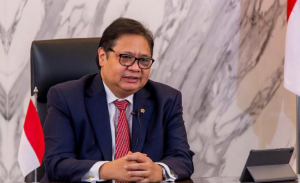Experts: U.S. tarriffs could jeopardize Indonesia's IT sector, weaken rupiah

computer-technology-isometric-min
Director for Digital Economy at the Center for Economics and Law Studies (CELIOS), Nailul Huda, has assessed that the impact of the U.S. reciprocal tariff policy has the potential to weaken the telecommunications and information technology (IT) sector in Indonesia.
Previously, U.S. President Donald Trump on Wednesday, April 2, 2025 announced a reciprocal tariff policy to several countries, including Indonesia, which took effect three days after the announcement.
The imposition of a general tariff starts at 10 percent for all countries starting from Saturday, April 5, 2025, then special tariffs for several countries will take effect on Wednesday, April 9, 2025.
A 32 percent reciprocal tariff has been declared for Indonesia. Other countries, such as the Philippines get 17 percent, Singapore 10 percent, Malaysia 24 percent, Cambodia 49 percent, Thailand 36 percent and Vietnam 46 percent.
"I see the U.S. import tariff policy will weaken domestic IT or technology industry. The reason is, our domestic industry is still unable to produce further," Nailul Huda said as quoted by Antara on Monday, April 7, 2025.
According to him, this policy has the potential to weaken domestic IT industry because local production capacity is still limited. The decline in export demand from the U.S. is considered to make it difficult for domestic products to find alternative markets.
On the other hand, domestic market is at risk of being flooded with IT products from other countries that are also affected by the U.S. import tariff policy. This is feared to further suppress the local industry which is facing declining exports as well as competition with imported products.
"This is worrying that our industry is under pressure from declining exports, but products from other countries can enter the country," he said.
He said another impact that needs to be watched out for is the weakening of the rupiah exchange rate. Electronics and IT industries are highly dependent on imports of main components such as chips, which are not produced domestically.
Meanwhile, the increase in import prices due to the weakening rupiah has the potential to hamper the growth of the technology sector. Huda suggested that the government immediately negotiate with the U.S. in order to lower Indonesia's trade tariffs to the U.S.
The U.S. government is considered to have set policies that hinder Indonesian products from entering the U.S. market, while on the other hand it also often imposes "non-tariff barriers" for imported products, including from Indonesia.
Meanwhile, one strategy that the government can take is to build a coalition with other countries, such as through BRICS (Brazil, Russia, India, China and South Africa) to strengthen its bargaining position.
"BRICS could be one of the entry points. In addition, boost our domestic IT or technology industry with incentives and so on," he said.
Weakening rupiah impact
Similarly, telecommunications observer and Executive Director of the ICT Institute, Heru Sutadi, reminded that the U.S. reciprocal tariff policy could have an impact on the weakening of the rupiah exchange rate against the U.S. dollar.
He said that the rupiah exchange rate against the dollar which reached Rp17,000 per dollar needs to be watched out for. If it continues to be depressed and breaks through Rp20,000 per dollar, this will have an impact on the telecommunications sector in Indonesia.
This weakening can also cause many stalled projects and difficulties in payment to vendors, considering that most telecommunications equipment comes from abroad and prices follow exchange rate fluctuations.
"Many stalled projects and difficulties in paying vendors because many of the equipment projects are from abroad, which will follow the movement of the rupiah. The same goes for telecommunications equipment prices," Heru said.
He reminded the government to pay attention to the long-term impact of U.S. policies, including the risk of declining purchasing power of the public for IT products.
"This is all an alarm for U.S. about the potential for economic crisis, social crisis and political crisis that occurred in Indonesia in 1998. We must be aware of it. The government must improve communication and governance," he said.
Already have an account? Sign In
-
Start reading
Freemium
-
Monthly Subscription
20% OFF$29.75
$37.19/MonthCancel anytime
This offer is open to all new subscribers!
Subscribe now -
Yearly Subscription
33% OFF$228.13
$340.5/YearCancel anytime
This offer is open to all new subscribers!
Subscribe now







